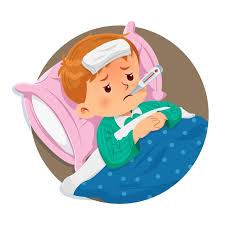What is Fever?
Fever, medically known as pyrexia, is the body’s natural response to an infection, inflammation, or other underlying health conditions. It is characterized by a temporary increase in body temperature, typically above 37.5°C (99.5°F), as the immune system works to fight off harmful invaders such as bacteria, viruses, or other pathogens.
Why Does Fever Happen?
When the body detects harmful substances, the immune system releases chemicals called pyrogens. These pyrogens signal the brain’s temperature-regulating center, the hypothalamus, to raise the body’s core temperature.
This rise in temperature can:
- Slow down the growth of bacteria and viruses.
- Boost the efficiency of white blood cells in fighting infection.
Common Causes of Fever
Fever can occur due to a variety of reasons, including:
- Infections – Common cold, flu, pneumonia, urinary tract infections.
- Inflammatory conditions – Rheumatoid arthritis, inflammatory bowel disease.
- Heat-related illness – Heat exhaustion or heatstroke.
- Vaccinations – A mild, temporary fever may occur as the immune system responds.
- Other causes – Certain cancers, autoimmune diseases, or medication reactions.
Symptoms That May Accompany Fever
In addition to elevated body temperature, you might experience:
- Chills and shivering
- Sweating
- Headache
- Muscle aches
- Weakness and fatigue
- Loss of appetite
- Dehydration
When to Seek Medical Help
While most fevers are mild and resolve on their own, you should seek medical attention if:
- Fever is above 39.4°C (103°F) in adults.
- Fever lasts more than 3 days.
- There are severe symptoms such as difficulty breathing, confusion, persistent vomiting, or chest pain.
- In infants under 3 months with a temperature above 38°C (100.4°F).
Managing Fever
- Stay hydrated – Drink water, clear soups, or electrolyte solutions.
- Rest – Allow your body to recover.
- Light clothing – Wear breathable fabrics and avoid heavy blankets.
- Fever-reducing medications – Paracetamol (acetaminophen) or ibuprofen, if recommended by a doctor.
The Bottom Line
Fever is not an illness itself but a sign that your body is fighting something. In most cases, it’s a beneficial immune response. However, persistent, very high, or unusual fevers should be checked by a healthcare professional to rule out serious conditions.
https://www.youtube.com/watch?v=jyF9WDGvGuk&t=1s&ab_channel=Medicas





Comments